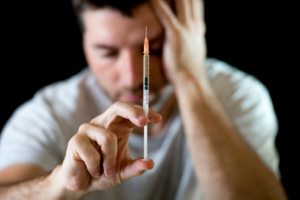Heroin use in the United States is more common than most people would like to think. While heroin may sound like a drug that’s only found with serious drug users and addictions, heroin use is actually fairly common among the general public. That’s because for 80% of heroin users, the addiction began as a dependency on painkillers. For Americans, heroin overdose is one of the most common causes of drug-related hospital visits. If you or a loved one is suffering from heroin addiction you can seek treatment at a nearby gender-specific rehab center such as The Hills Center which offers both a men’s and women’s heroin rehab program.
The Heroin Epidemic

close up of Syringe and Needle and heroin drug addict
The spread of heroin use is so prevalent in the United States that many people call it a heroin epidemic. Over the last decade especially, heroin use has more than double in young adults ages 18-25. With growing rates of heroin addiction, the risk for heroin overdose increases as well. In 2015 alone, nearly 13,000 people died from a heroin-related overdose.
The heroin epidemic is especially affected by the prevalence of prescription medications in the United States. Heroin and many prescription painkillers contain the same chemicals and produce similar effects. For those that develop a dependency to painkillers, it’s common for them to jump to heroin once their prescription runs out.
Signs of Heroin Abuse
There are a number of physical and behavioral symptoms that point to a heroin abuse problem. If you notice these symptoms alongside evidence of paraphernalia or track marks along the person’s arms, then it’s time to talk to them about their substance abuse:
- Flushed skin
- Disorientation
- Rapid weight loss
- Tired eyes and small pupils
- Poor performances in work or school
- Apathy
- Frequent lying
- Neglecting personal hygiene and healthy sleep patterns
The more a person uses heroin, the more they’ll need to achieve the results they desire. If they’re unable to acquire what they need, they’ll begin experiencing withdrawal symptoms.
Withdrawal symptoms for heroin can be severe and the user will suffer without the help of a medical professional. Withdrawal symptoms can also cause permanent damage to the user’s body and mind, so the person should find medical attention as soon as possible. Symptoms of heroin withdrawal include:
- Hallucinations
- Restlessness
- Irritability
- Anxiety
- Joint and muscle pain
- Nausea and vomiting
- Disorientation
- Cold flashes
Attempting to self-detox can also trigger withdrawal symptoms. This is why medical professionals never advise a self-detox. While detox does play a key role in overcoming substance addiction, it’s not a process the person should go through alone. The aid of a medical professional or facility will ensure a safer and more successful detox process.
Recognizing a Heroin Overdose
The worst outcome for a heroin addiction is an overdose. Ideally, a user will find seek out treatment before their addiction reaches this point, but for many help comes too late. Recognizing these signs of addiction could prevent a fatal outcome:
- Extremely slow pulse
- Unresponsiveness
- Clammy skin and cold flashes
- Nausea and vomiting
- Slow breathing
If someone is exhibiting these symptoms after using heroin, then they need medical attention immediately. Heroin use doesn’t have to end this way, but you have to make the call and seek treatment for heroin abuse today.


